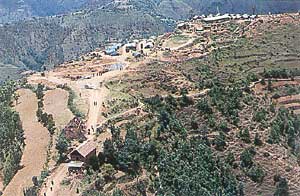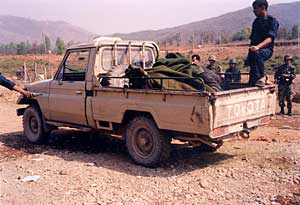 It is clear that the fight against Maoists was not a choice but a compulsion for the government. It is a struggle between mindless violence and the rule of law. But, what emerges from a recent fact-finding mission by the National Human Rights Commission (NHRC) to the midwest is a picture of human rights violations on an unprecedented scale, and local civilian authorities unable or unwilling to maintain proper records of the dead, or abiding by due process.
It is clear that the fight against Maoists was not a choice but a compulsion for the government. It is a struggle between mindless violence and the rule of law. But, what emerges from a recent fact-finding mission by the National Human Rights Commission (NHRC) to the midwest is a picture of human rights violations on an unprecedented scale, and local civilian authorities unable or unwilling to maintain proper records of the dead, or abiding by due process. In Khara we met a young boy who had been forced by attacking Maoists to ferry a wounded fighter five hours away in the middle of the night. He was sent back without food or rest, with a warning that he would be killed if he talked. Elsewhere we have heard about families who have lost their dear ones in Maoist attacks, but don't even have a place to lodge complaints. In Rukum ordinary people are afraid to talk. They can be mistaken for Maoists by security forces, or killed by rebels who have ordered all the villagers to stay put.

A young man from Sindhuli had given up Maoist politics a long time ago. But, fearing for his life, he came to the NHRC in Kathmandu asking for protection. He was arrested less than a month later. No one has heard from him since.
A boy from Lamjung also came to Kathmandu in search of information about his father who had been arrested about a month earlier. It took the NHRC several letters to the government to find out what had happened. The boy's father had been killed in "an encounter" a day after his arrest. The family was never told what happened, and the boy travelled all the way to Kathmandu to hear of his father's death.
Then there are stories of Maoist atrocities, abductions, kidnappings of family members. Many parents come to the NHRC seeking help in finding their children. Everywhere the commission members went on a recent trip to the west, we heard stories of threats, intimidation and demands from the Maoists.
The NHRC went to Satbaria in Dang, made inquiries at Nepalganj, the nerve centre of the anti-terrorism operations, and travelled to Khara in Rukum, where soldiers repelled a major Maoist attack in May. The government had said at the time that it had recovered 92 bodies in Satbaria, but very few were accounted for, many had been defaced, and few were in combat fatigues. More worrying was the fact that the Chief District Officer (CDO) had not visited the site of the battle even a week after the attack. We asked the police chief at Ghorahi if he could provide information; he said he did not know, because the dead belonged to the paramilitary.
The Police Act says that a postmortem of all unidentified dead bodies or those killed in accidents must be carried out, and documentation maintained. Then there are international conventions and treaties which say that every effort has to be made to hand over the dead bodies to relatives. Nothing of the sort is happening. Those who have been shot or fall in battle are simply left there. I have never seen human life treated with such a lack of dignity, and such neglect of human bodies.
 In Nepalganj we came across four dead bodies under a small bridge. They had already rotted and wild animals had gnawed away their skulls. The bridge was 5 km away from the CDO's office. We asked around, but very few civilian authorities had any information on the bodies. We came back and wrote to the Cabinet Secretariat asking the government to be more accountable. We understand the secretariat wrote to the Home Ministry, which we presume wrote to the CDO, and the CDO to the local police office. We don't know if the police now have a positive ID of the bodies. But that is not the point. What if we had not informed the authorities in Kathmandu? Would the bodies just have remained there until nothing was left?
In Nepalganj we came across four dead bodies under a small bridge. They had already rotted and wild animals had gnawed away their skulls. The bridge was 5 km away from the CDO's office. We asked around, but very few civilian authorities had any information on the bodies. We came back and wrote to the Cabinet Secretariat asking the government to be more accountable. We understand the secretariat wrote to the Home Ministry, which we presume wrote to the CDO, and the CDO to the local police office. We don't know if the police now have a positive ID of the bodies. But that is not the point. What if we had not informed the authorities in Kathmandu? Would the bodies just have remained there until nothing was left? In Dang, we were told that some of the bodies of people killed in encounters had close-range gunshots. Army officers the NHRC interviewed are equally appalled by the lack of initiative of the civil administrators. In Khara, an officer told us that the CDO had not visited the scene of the battle, and, unable to live with the stench of rotting bodies, the army had buried them. We asked the CDO in Rukum if that was true. He replied that there was no way for him to get there, and that leaving the headquarters itself was very risky.
Government officials elsewhere lament that the first they hear about the day's encounters is on the Radio Nepal news from Kathmandu. The district level security committees are non-functional, and this is reflected in the shoddy manner in which records and insurgency statistics are kept.
The government has not yet formed a monitoring agency as is required by Article 13 of the Terrorism and Disruptive Activities (Prevention and Control) Act. The government has also not formed the special courts that the law calls for. A person in a very responsible position in government told us that judges were not willing to take up the job. But many district and regional judges told us that this is not the case. Are the special courts not being formed because there is a fear that they might free detainees?
In fact, however, army personnel we met don't want to hold on to prisoners, because it means feeding them with their own rations. The government jails are already full, and because there are no courts to hear the charges, the detainees crowd existing jails to bursting point. The NHRC, with the help of the British, Danish and Norwegian governments, is now organising teams of volunteers to monitor the human rights situation in conflict zones. At the very least, we hope to keep proper records of the implementation of national laws and international humanitarian laws as well as the international instruments to which Nepal has obligations.
When the emergency is over, and this dirty war comes to an end, the people must get justice.
(Sushil Pyakurel is a member of the National Human Rights Commission.)



